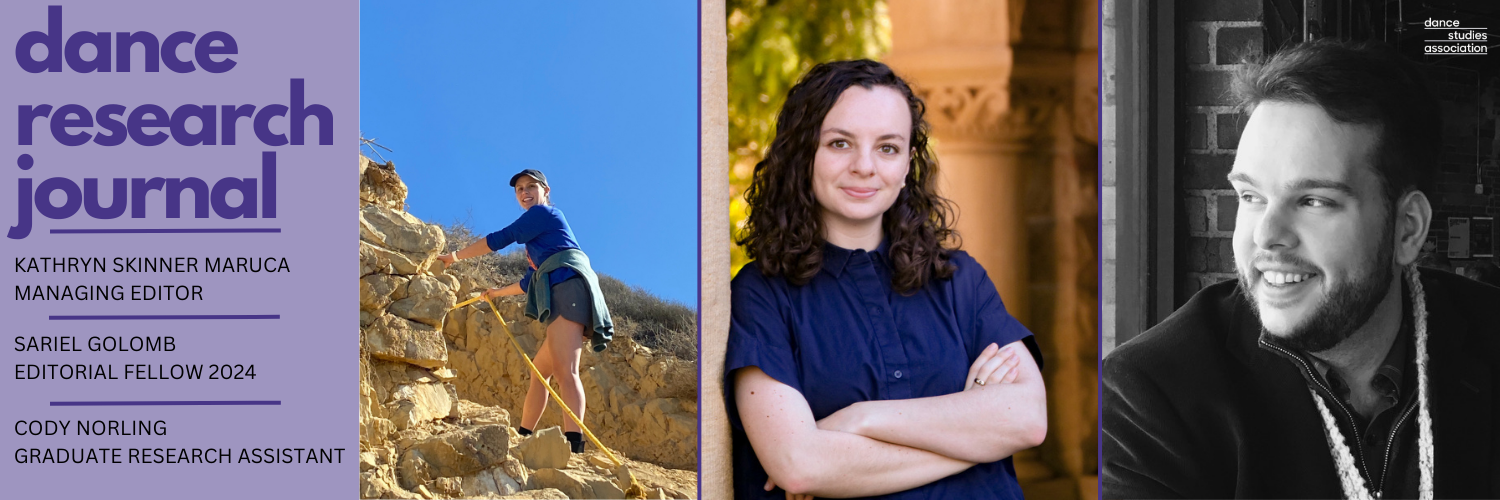Editorial Fellows 2025DSA is continuing to move forward with more transparency and equity in our labor and compensation practices. To that end, DSA has formalized publication support through Editorial Fellowship roles. Much of this publication support - administrative and editorial - has been happening informally behind the scenes for years, and we are thrilled to highlight this essential labor and offer year-long contracts with stipends.
Kathryn Maruca is a Brooklyn-based mover and administrative professional working in the nonprofit sector. Before her current position as Operations Manager with Girls on the Run NYC, Katie worked in artist programming at Baryshnikov Arts Center, managing artist residencies and fall and spring season performances. As a dancer, she has performed and presented work around New York City since 2015. She served as Editorial Assistant for Dance Research Journal, The Oxford Handbook of Dance and Politics and Dancing the World Smaller: Staging Globalism in Mid-Century America under the direction of Dr. Rebekah J. Kowal. Katie received a BFA in Dance and a BA in English from the University of Iowa, along with a certificate in Copyediting through the University of San Diego Extension Program. Sariel Golomb is a PhD Candidate in Theater and Performance Studies at Stanford University. She holds a BA in English and Dance with departmental honors from Columbia University. Her research explores corporeality, the politics of representation, and the erotics of the gaze in 20th- and 21st-century theatrical dance. Her writing appears in The Brooklyn Rail, ODC.Dance.Stories, Dance Research Journal, TDR (The Drama Review), and The Articulate Body: Dance and Science in the Long-Nineteenth Century, coedited with Lynn Matluck Brooks and Garth Grimball (forthcoming). She is the recipient of two Carl Weber Memorial Fellowships (2021-2023) and a 2022 Selma Jeanne Cohen Award. Cody Norling is a PhD candidate in historical musicology at the University of Iowa, where he has taught and assisted courses in Western music history and American popular music. As an archives-based historian, he studies topics related to opera production and reception in the United States and is currently undertaking dissertation research regarding the civic density of operatic cultures in 1920s Chicago. His published work can be found in American Music, The Opera Journal, and a recent volume on Midwestern identity formation from Hastings College Press. Cody has also given papers for the annual conferences of the American Musicological Society, Society for American Music, and Midwest History Association. In 2016, he was the recipient of the National Opera Association’s Leland Fox Scholarly Paper Award. Cody is currently Adjunct Instructor of Music Appreciation at Western Technical College, and he serves as Web Manager for the American Musicological Society’s Midwest Chapter.
T. Shacon Jones II (he/him) is an artist-scholar-activist and PhD candidate at Stanford University in the Department of Theater and Performance Studies, with PhD minors in Comparative Studies in Race and Ethnicity and Feminist, Gender, and Sexuality Studies. His research focuses on race, pleasure, dance, performance of masculinities, aesthetics of risk, and technology. Primarily interested in the Black male body in undervalued citizenship-making and life-sustaining practices, his dissertation examines mundane and spectacular choreographies of Black men engaged in radical pleasure in the United States and abroad. Before coming to Stanford, Shacon was a senior-level administrator for New Haven Public Schools and Bronx Community College. He has trained at the Ailey School, Atlanta Ballet, the British American Drama Academy (BADA), and the Shanghai Theater Academy. Shacon holds a Certificate in Critical Consciousness and Anti-Oppressive Praxis from Stanford, an M.A. in Education from Stanford Graduate School of Education, an M.F.A. in Theatre Management and Producing from Columbia University, and a B.A. in English and Dance from Morehouse College. Outside of research and teaching, he is involved in foster youth advocacy and is pursuing certification as an intimacy consultant for live performance. Crystal Song is a PhD candidate in performance studies at the University of California, Berkeley. Her research brings a sustained ethnographic focus to communities of Asian American competitive ballroom dancers. Each of our three publications require different hourly commitments, and thus the stipend is calculated based on a minimum pay of $21/hour. DRJ is also grateful to the University of Iowa for creation of a research assistantship for the 2023-2024 school year. Editorial labor is historically understood as uncompensated service labor, and thus holds up inequitable systems of power that relies on access to capital in order to take on leadership within the field. As always, we need your help to do this work and ask for your donation in support of DSA's equitable compensation practices. Thank you to all of those who support DSA's incredible publications. You can read about our publications HERE. |


